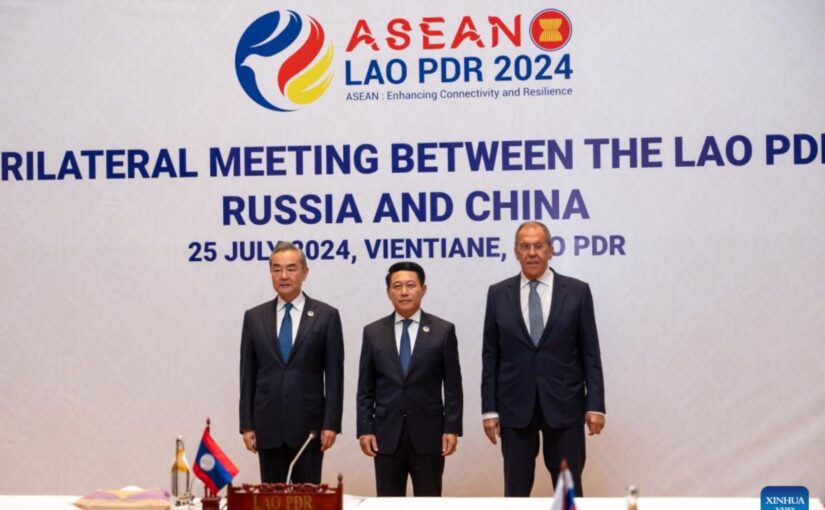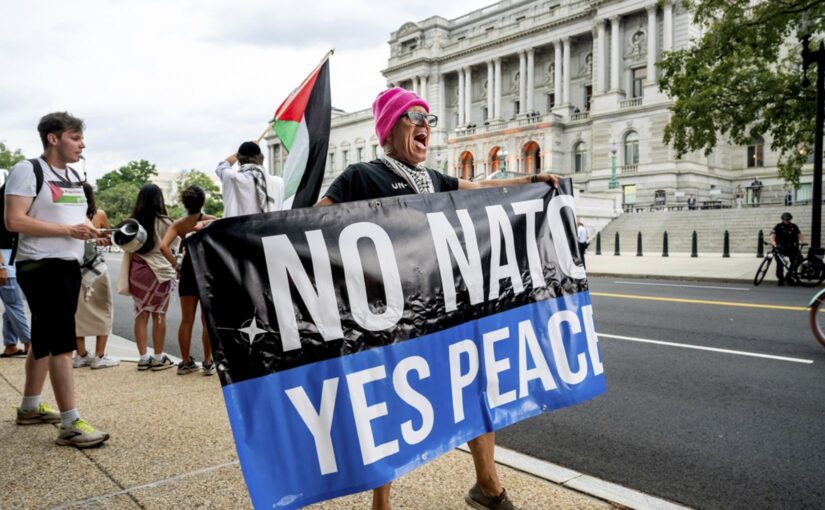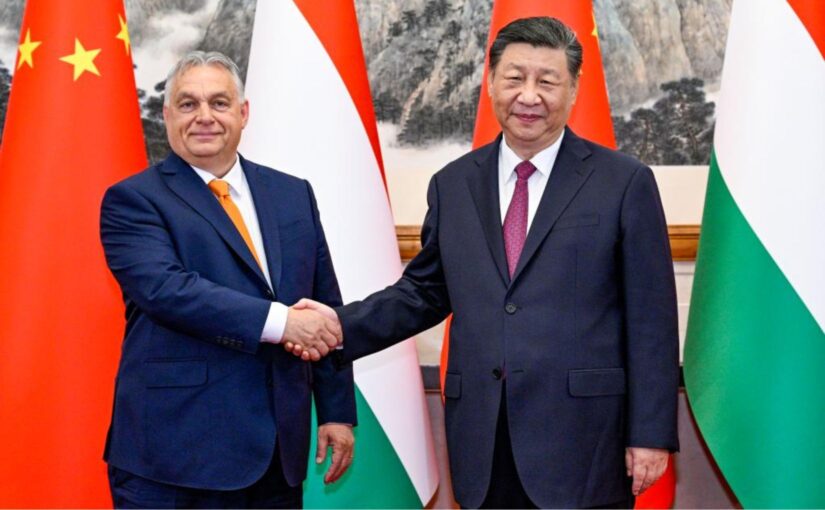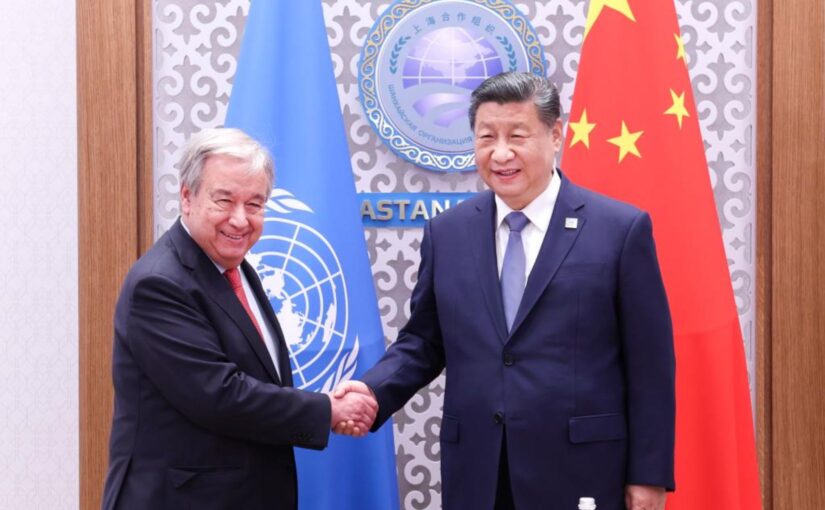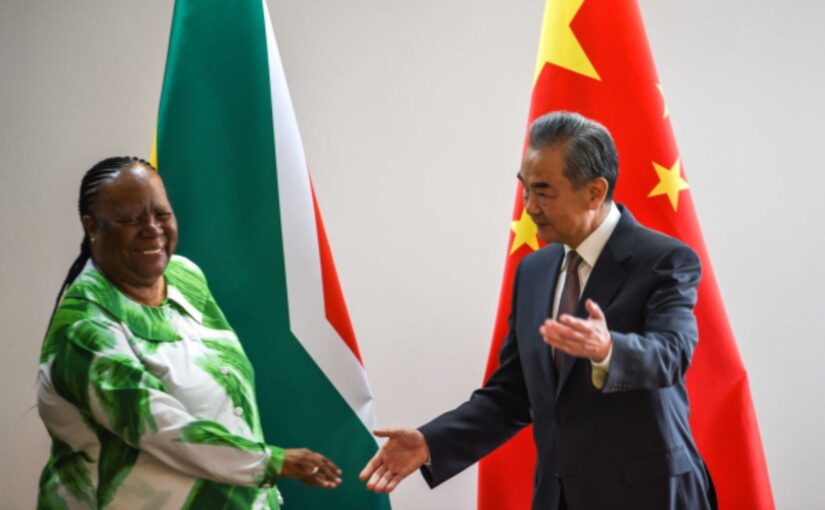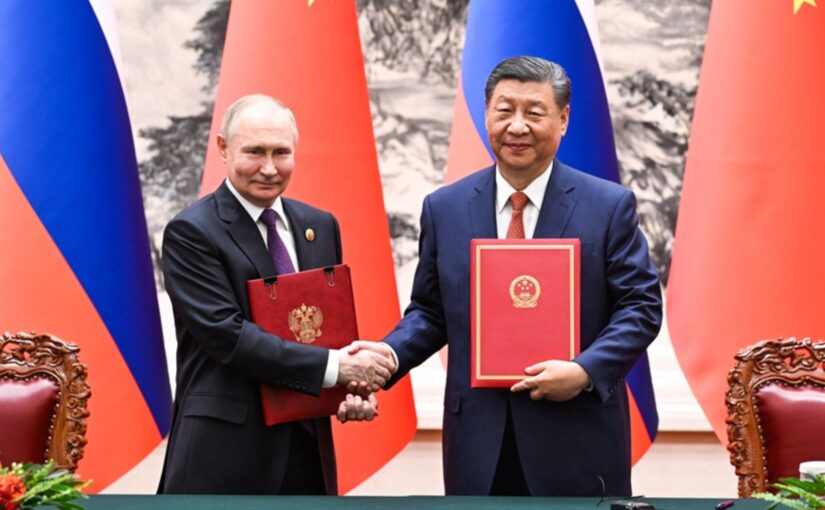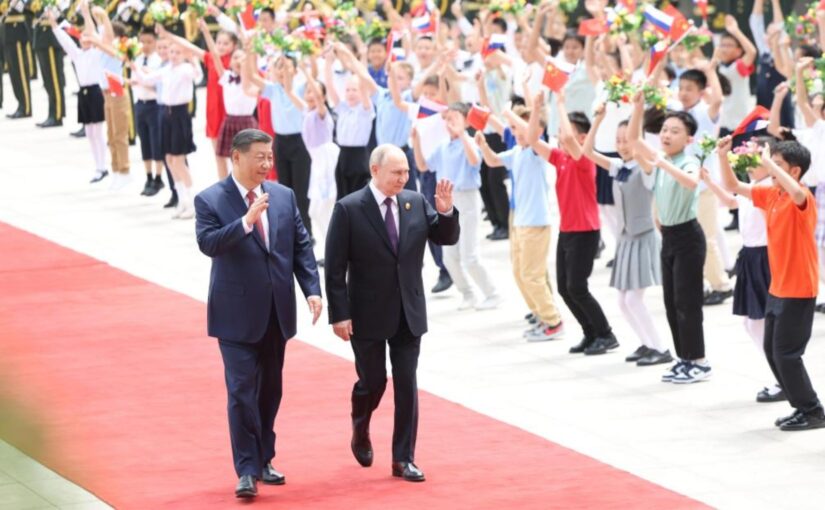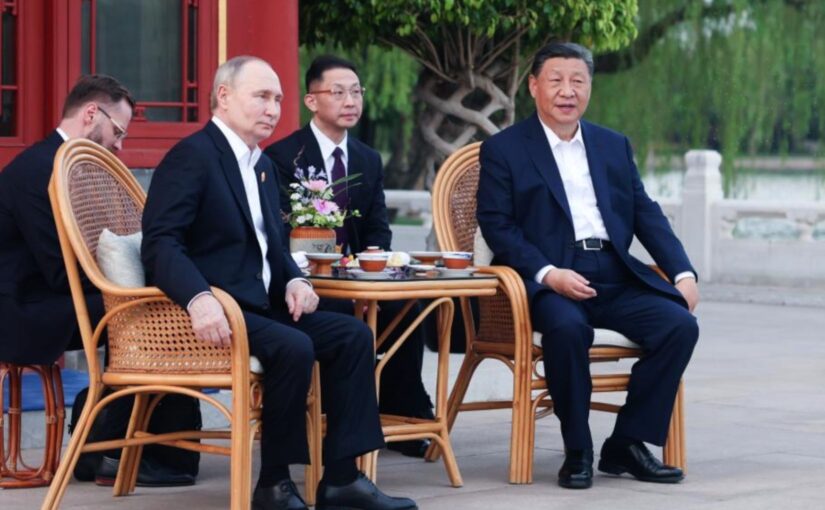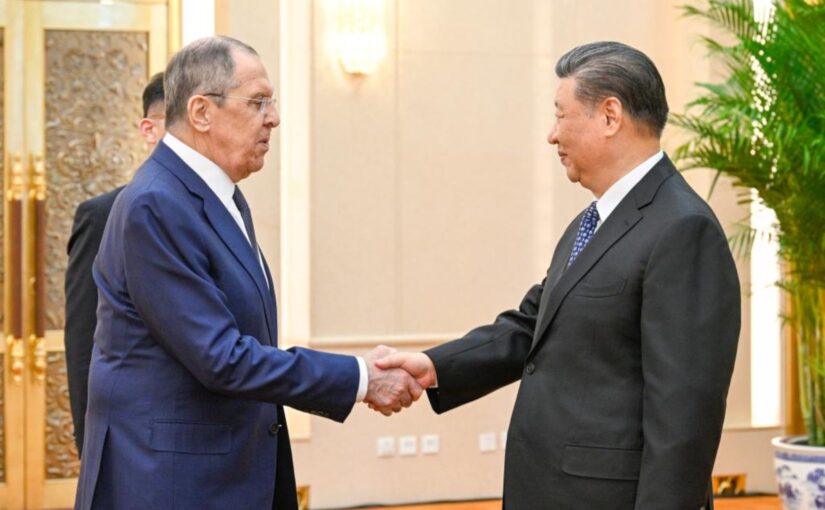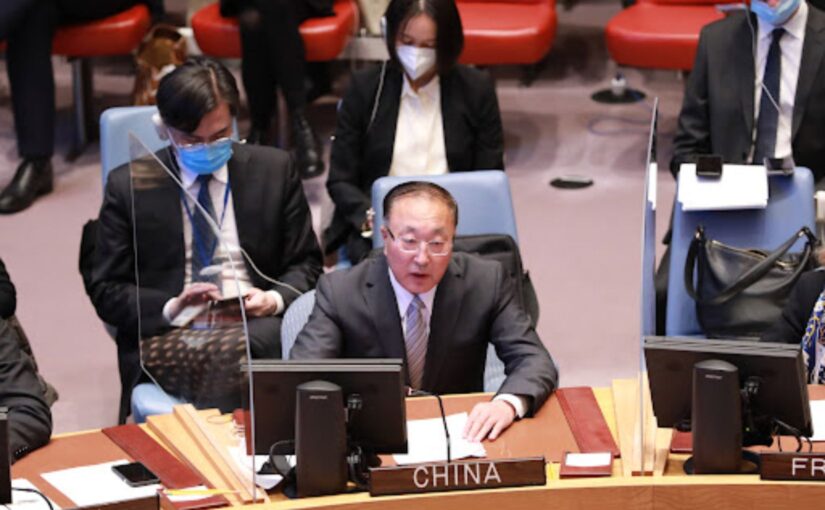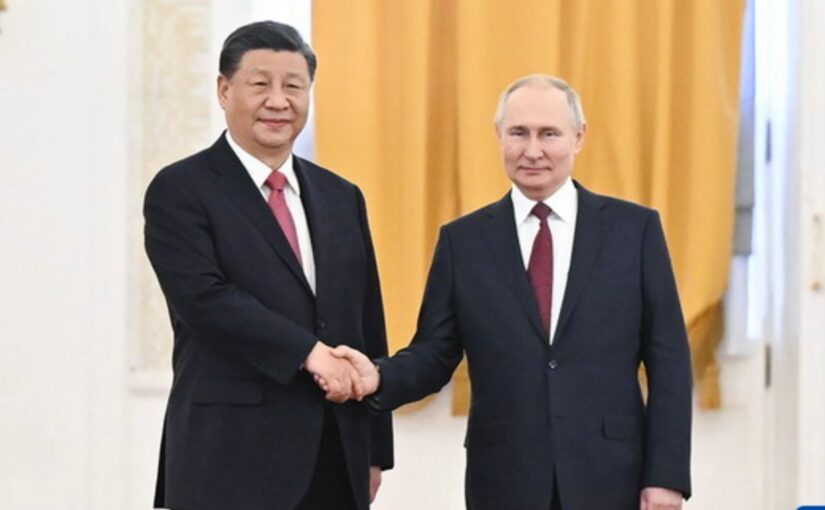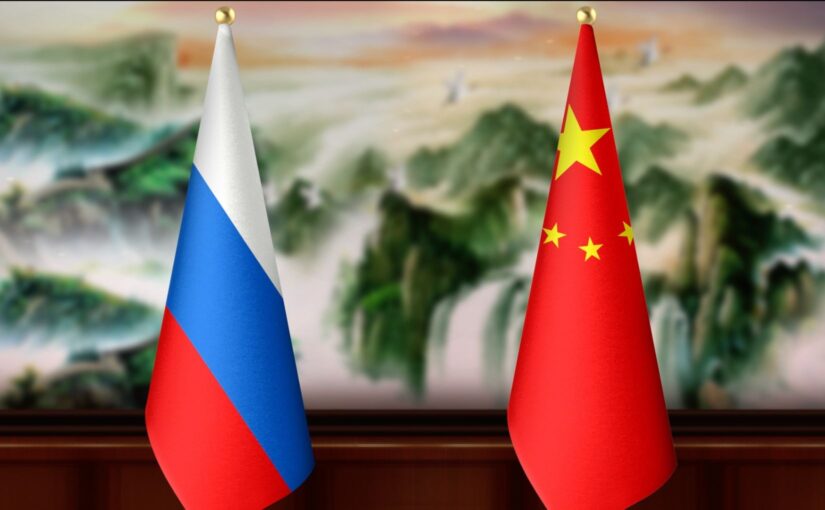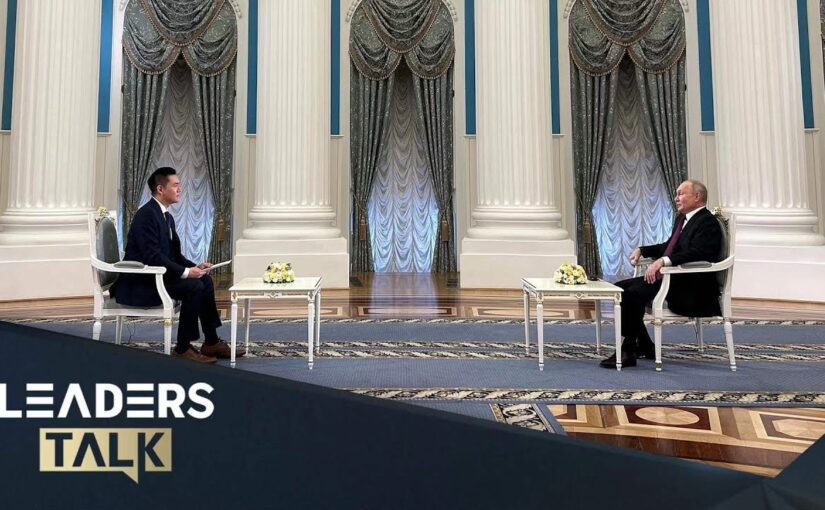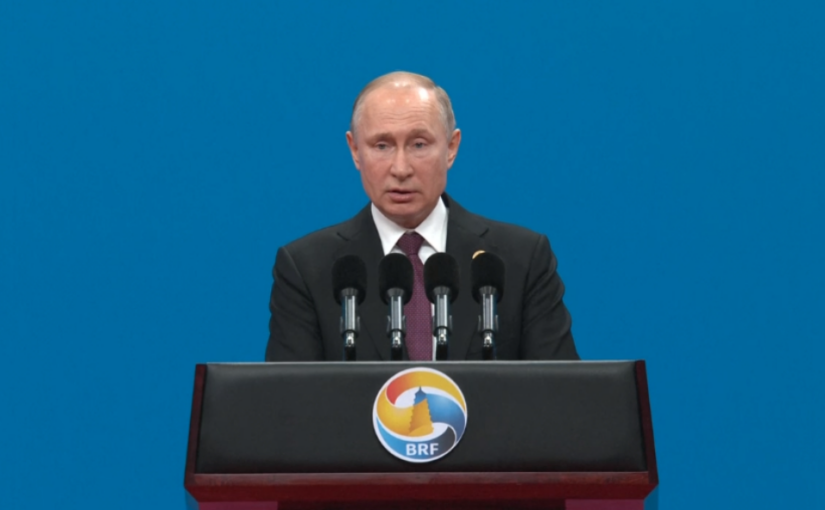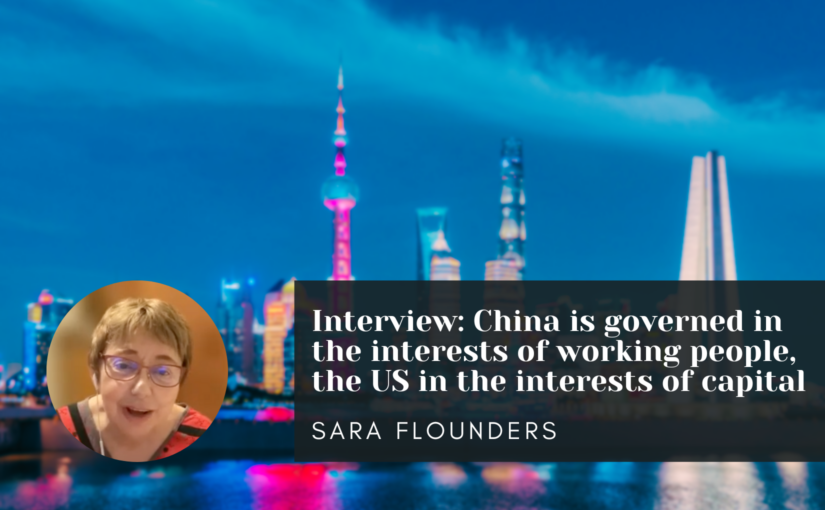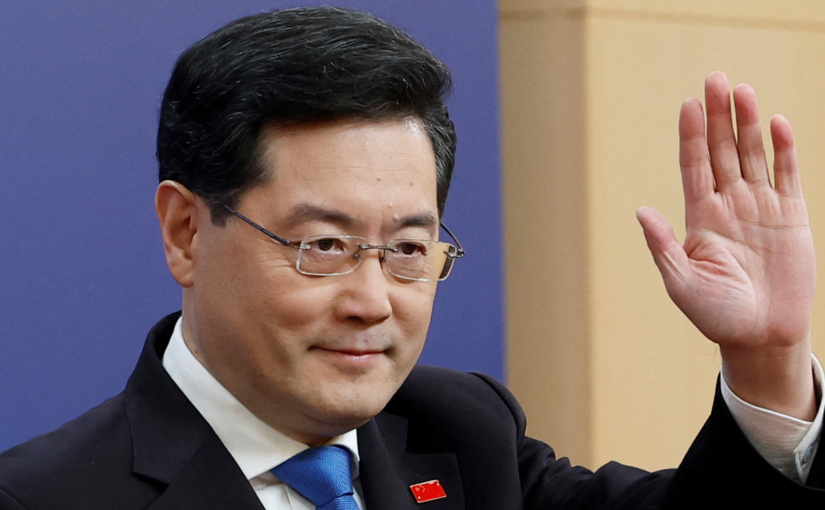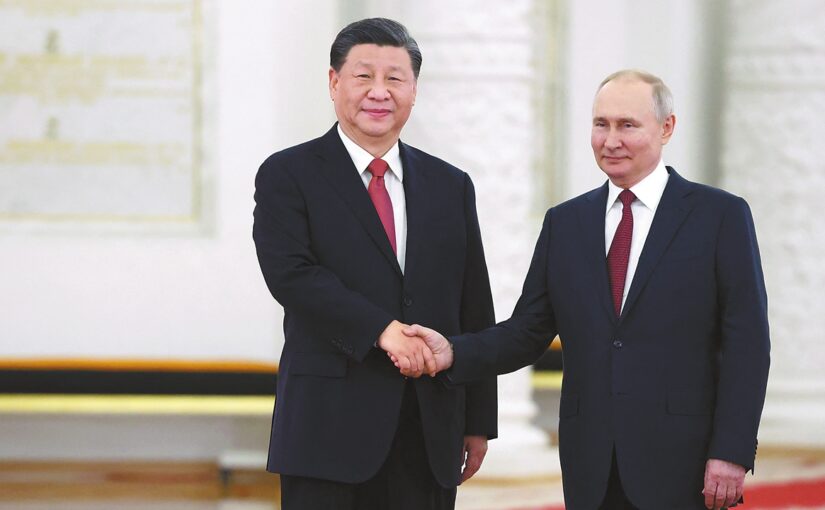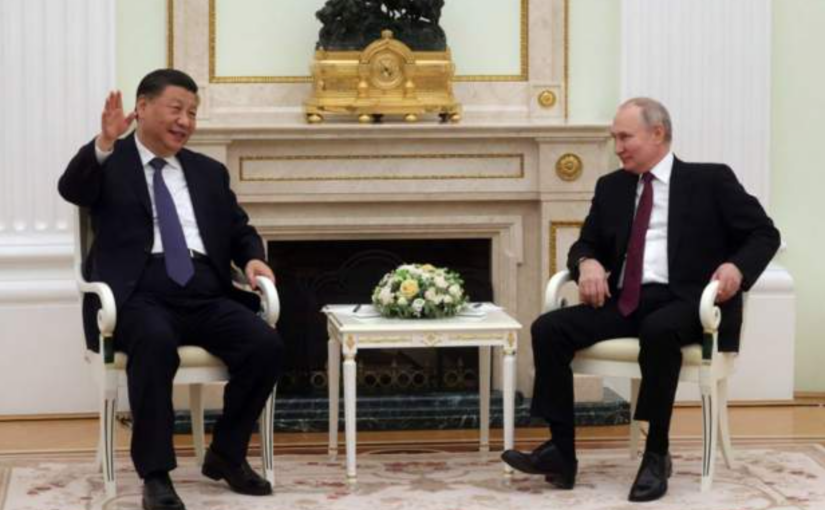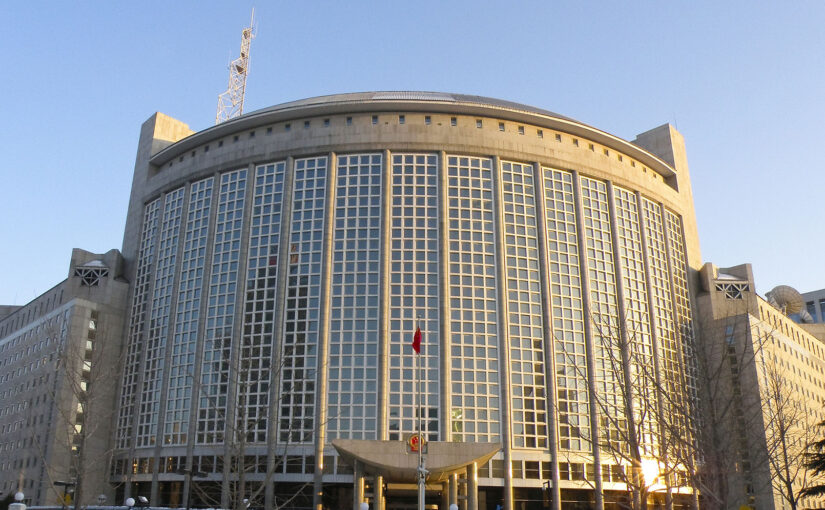Russian President Vladimir Putin paid a state visit to China from May 16-17 at the invitation of President Xi Jinping. It was Putin’s first foreign trip since he began his fifth term as Russian President and the 43rd meeting between the two leaders.
In their talks, the two sides made a comprehensive review of the successful experience in developing the China-Russia relationship and had an in-depth exchange of views on their relationship as well as major international and regional issues of mutual interest, charting the course forward for their cooperation across the board.
Xi stressed that this year marks the 75th anniversary of diplomatic relations between China and Russia. In the past three quarters of a century, the China-Russia relationship has grown stronger amidst wind and rain and stood the test of a changing international landscape. It has become a fine example for major countries and neighbouring countries to treat each other with respect and candour and pursue amity and mutual benefit.
The most important conclusion drawn from the 75-year history of China-Russia relations is that two neighbouring major countries must always promote the Five Principles of Peaceful Coexistence, respect each other on an equal footing, trust each other, accommodate each other’s concerns, and truly provide mutual assistance for the development and revitalisation of both sides, Xi noted, adding that this is not only the correct way for China and Russia to get along, but also the direction that major-country relations should strive for in the 21st century.
Putin expressed his pleasure to visit China again after he was sworn in as Russian president for a new term. Noting that President Xi also paid a state visit to Russia in March last year, shortly after his re-election as Chinese president, Putin said that it is a friendly tradition between the two countries, which demonstrates that both sides attach high importance to enhancing the Russia-China comprehensive strategic partnership of coordination for the new era.
The development of Russia-China ties is not out of expediency or targeted at any third party, Putin said, adding that it benefits international strategic stability.
After the talks, Xi and Putin signed and issued the Joint Statement of the People’s Republic of China and the Russian Federation on Deepening the Comprehensive Strategic Partnership of Coordination for the New Era in the Context of the 75th Anniversary of China-Russia Diplomatic Relations and witnessed the signing of a number of bilateral cooperation documents.
They also made statements to the press.
Xi Jinping said China and Russia have served as a role model by showing others the ways of building state-to-state ties of a new kind and working together as two major neighbouring powers.
“Our commitment to the following five principles has made all of this possible.
“The first principle involves demonstrating mutual respect and firm commitment to supporting each other on matters dealing with the core interests of both sides. Our two countries are committed to acting in the spirit of non-alignment with any blocs, rejecting confrontation and refraining from targeting any third countries while demonstrating our steadfast commitment to confidence building measures on political matters, respecting the development trajectories we choose for ourselves and firmly supporting each other as we strive for shared prosperity and revival.
“The second principle consists of promoting a win-win approach to shaping a new architecture of mutually beneficial cooperation. We must support networks promoting fundamental research, unleash our cooperation potential in high-technology sectors, step up our cooperation on border crossings, transport and logistics, and ensure the stable operation of global manufacturing and supply chains.
“The third principle deals with maintaining our centuries-old friendly ties and passing on this friendship from one generation to another. People from average Chinese families read Pushkin’s and Tolstoy’s books, while traditional Chinese culture, including the Beijing Opera and Taichi, have been very popular among Russians.
“The fourth point is that we must act in the spirit of strategic cooperation to set various visions of global governance on the right track. China and Russia have been firmly advocating a UN-centred system of international relations and an international order based on international law.
“We express our firm commitment to working together in the context of Russia’s BRICS chairmanship this year and when China assumes the SCO [Shanghai Cooperation Organisation] presidency in the second half of the year by forging a comprehensive, closely-knit, result-driven and inclusive high-level partnership for uniting the Global South and making it stronger.
“The fifth principle deals with promoting a political settlement for hotspots in the interest of truth and justice. Today’s world is still plagued by Cold War mentality. Aspirations to securing a unilateral hegemony, bloc-based confrontation and power politics pose a direct threat to peace and security for all countries around the world. President Putin and I discussed the need to achieve an immediate settlement in the Israeli-Palestinian conflict and to resolve the Palestinian issue based on the two-state solution and in keeping with the UN resolution.”
For his part, Vladimir Putin said: “I would like to emphasise that this state visit takes place in the year of the 75th anniversary of our diplomatic relations. Our country was the first to recognise the People’s Republic of China on October 2, 1949, the day after its declaration. We also provided substantial assistance to it at the initial stage of the development of its political system, state institutions and the economy.
Turning to current economic issues, he added: “The enhancement of trade and investment ties [has been] greatly aided by the coordinated measures implemented to shift payments between our countries into national currencies. Currently, the ruble and yuan comprise over 90 percent of Russian-Chinese commercial transactions, with this proportion steadily increasing. This trend signifies that our mutual trade and investment are securely protected from the influence of third countries and adverse developments on global currency markets.
He also remarked that: “Our talks have reaffirmed that Russia and China have similar or identical views on many international and regional issues. Both countries have an independent and sovereign foreign policy. We are working together to create a fairer and more democratic multipolar world order based on the central role of the UN and its Security Council, international law, cultural and civilisational diversity, as well as a calibrated balance of interests of all members of the international community. Acting from these positions, Russia and China are fruitfully working together in BRICS, where Russia is holding the chairmanship this year, and in the Shanghai Cooperation Organisation, the chairmanship of which China will take over in July. Of course, our countries are resolved to continue working to align the integration processes underway within the framework of the EAEU [Eurasian Economic Union] with China’s Belt and Road Initiative, with a view to ultimately creating a Greater Eurasian Partnership.”
The two leaders also held a personal meeting, in which President Xi noted that, having lasted three quarters of a century, China-Russia relations have grown from strength to strength despite the ups and downs. and have stood the test of changing international landscape. Over the years, he and President Putin have met more than 40 times and stayed in close communication, providing strategic guidance that has ensured the sound, steady and smooth development of the relationship. The China-Russia relationship today is hard-earned, and the two sides need to cherish and nurture it.
Steady development of China-Russia relations is not only in the fundamental interests of the two countries and the two peoples, but also conducive to peace, stability and prosperity of the region and the world at large. On the new journey, China is ready to work with Russia to stay each other’s good neighbour, good friend and good partner that trust each other, continue to consolidate the lasting friendship between the two peoples, and jointly pursue respective national development and revitalisation and uphold fairness and justice in the world.
Premier Li Qiang also met with the Russian leader.
Li said that in recent years, under the strategic guidance of the two heads of state, China and Russia have been developing bilateral relations on the basis of non-alliance, non-confrontation and not targeting any third party. He added that their practical cooperation in various fields has been steadily promoted, people-to-people and sub-national exchanges have flourished, and public support for friendly relations between the two countries has been increasingly consolidated, setting an example of peaceful coexistence and win-win cooperation between major countries.
Noting that this year marks the 75th anniversary of China-Russia diplomatic ties, Li said China is willing to work with Russia to follow the strategic guidance of the two heads of state, consolidate and carry forward their long-standing friendship, deepen cooperation in various fields, promote the common development of China and Russia, better benefit the two peoples, and contribute to the building of a community with a shared future for humanity.
He added that China is ready to work with Russia to further synergy and deepen cooperation between the Belt and Road Initiative and the Eurasian Economic Union, promote regional integration, enhance trade liberalisation and facilitation, and deepen cooperation in such areas as economy, trade, energy and connectivity.
The two sides should take the China-Russia Years of Culture as an opportunity to further promote cooperation in the fields of cultural tourism, sports, youth, medical and health care, and continuously enhance mutual understanding and friendship between the two peoples.
Noting that Russia-China relations have reached the highest level, Putin said Russia is willing to work with China to take the celebration of the 75th anniversary of the establishment of bilateral diplomatic ties as an opportunity to further strengthen cooperation in such fields as economy, trade, energy, agriculture and infrastructure construction, make the Russia-China Years of Culture a success, deepen people-to-people and cultural exchanges, and push the Russia-China comprehensive strategic partnership of coordination for the new era to a new level.
That evening the two presidents attended the opening ceremony of the China-Russia Years of Culture and a special concert celebrating the 75th anniversary of China-Russia diplomatic ties.
Xi said that: “Last year, President Putin and I agreed to make 2024 and 2025 the China-Russia Years of Culture. The two sides officially launched this cultural event today.” He added that the two countries will hold a series of cultural exchange programs to further release the potential of bilateral cultural cooperation and jointly open up a new future of China-Russia cultural exchanges.
The second day of President Putin’s visit was spent in Harbin, the capital of China’s northeast Heilongjiang Province and a city with deep historical connections to Russia since the nineteenth century.
Accompanied by Chinese Vice President Han Zheng, Putin attended the opening ceremony of the 8th China-Russia Expo in the city.
In his congratulatory letter, which was read by Han Zheng, Xi said that with the joint efforts of the two countries, China-Russia relations have made solid progress step by step and delivered tangible cooperation outcomes to the benefit of the two peoples.
Stressing that after years of cultivation and development, the China-Russia Expo has become an important platform for promoting bilateral economic and trade cooperation, he added that it is hoped that all sectors of the two countries will make full use of the opportunity presented by the current China-Russia Expo to deepen exchanges and share opportunities, jointly contribute to the mutually beneficial cooperation between China and Russia, and inject new impetus into the development of the China-Russia comprehensive strategic partnership of coordination for a new era.
Noting that Russia cherishes the tradition of friendly cooperation with China, Putin expressed the hope that the two sides will tap the potential and actively leverage the role of the expo to push for new progress in bilateral cooperation in such fields as economy, trade, investment, energy, industry, high and new technology, cross-border transportation, tourism, agriculture and local affairs, to bring more benefits to the two peoples.
After the opening ceremony, Han met with Putin.
Han said China-Russia cooperation has enjoyed a sound momentum in recent years.
The Belt and Road Initiative has been further aligned with the Eurasian Economic Union, and a number of major projects have been smoothly advanced, adding that the China-Russia Expo was a beautiful “business card” of bilateral economic and trade cooperation. It is believed that with the joint efforts of the two sides, bilateral cooperation will surely achieve more results, benefit the two peoples and contribute to world development and progress.
For his part, Putin called on the two sides to closely coordinate and cooperate, strengthen practical cooperation in various fields, further promote local cooperation between Russia’s far east and China’s northeast region, and push for better development of bilateral relations.
Putin also visited the Harbin Institute of Technology, where he delivered a speech to Chinese and Russian students and faculty members, noting how the institute had originally been established by Russian professionals as a Russian-Chinese technical college to train personnel for the Chinese Eastern Railway.
Whilst in Harbin, President Putin also laid flowers at the monument to the Soviet Red Army soldiers who gave their lives in the liberation of northeast China from Japanese militarism and visited the Russian Orthodox Church of the Intercession.
In a press conference concluding his visit, Putin answered a large number of questions from the international media and stated:
“Of course, it is necessary to strengthen the emerging multipolar world. There is absolutely no doubt that a new world is taking shape before our eyes and becoming multipolar. I believe all the people are aware of this. It is important that those who are trying to maintain their monopoly on making decisions on all issues globally should realise this (I believe that they do realise it perfectly well). Understanding this, they should do everything possible to facilitate this natural process. I repeat, this process should be peaceful and conflict-free, with the opinions of all parties to the international process fully considered. All of us should seek compromises while making the difficult decisions that lie ahead.”
Meanwhile, coinciding with the state visit, a memorial plaque commemorating the former head of the Soviet expert group to China Ivan Vasilievich Arkhipov was unveiled in the Russian city of Kaluga, southwest of Moscow, on May 15.
The ceremony was attended by representatives from China and Russia as well as Arkhipov’s descendants.
At the ceremony, Minister Counsellor of the Chinese Embassy in Moscow Liu Qinghua noted that Arkhipov significantly contributed to helping New China revitalise its national economy and achieve the goals of the first Five-Year Plan, adding that he made unremitting efforts to consolidate and continue the friendship between the two peoples.
Arkhipov, who died in 1998, led the work of the former Soviet expert group to China in the 1950s. He received multiple awards from both countries for his contribution to their bilateral ties. He always remained highly respected in China, even when the Soviet Union and China became estranged on the state level and official relations were hostile.
The following articles were originally published by the Xinhua News Agency and on the websites of the Russian Presidency and the Chinese Foreign Ministry.
